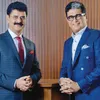This week's top SMBStory picks highlight entrepreneurs who turned adversities into opportunities
We pick the stories of three entrepreneurs who turned bad times into opportunities that led to record-breaking growth and achievement.
The word ‘rest’ doesn’t exist in the dictionary of an entrepreneur.
Most of them work round the clock to ensure the business is running smoothly despite the many ups and downs. And when we hear of success stories, what don't get highlighted are all adversities that peppered these entrepreneurs' paths.
Therefore, we at SMBStory list three entrepreneurs who turned bad times into opportunities that led to record-breaking growth and achievement.

Milan Thakkar- CEO of Walplast
In 2015, Mumbai-based , founded by Ashok Mehta in 2004, got in touch with Milan. The company was into the manufacturing of infrastructure raw materials. Its core product is wall putty; other products include primabond, block jointing mortars, ready-mix plaster, crack fillers, etc.
The top management of Walplast was looking at creating some value additions for the company. The B2C line of Walplast was bleeding, and Milan was given the charge to overturn the fortunes of the vertical and was made the CEO of Walplast Products Pvt. Ltd.

Milan Thakkar, CEO of Walplast
He says, “On joining Walplast, I set some ground rules. This was followed by establishing new teams, getting the best of the talent from the industry for top-notch results, remaking structures, and laying norms for new governance.”
All his efforts were paid off when the company grew at a CAGR of 80 percent in the next three years, despite the slump in the infrastructure and real estate market, clocking Rs 150 crore-plus turnover.
Harkirat Singh - Managing Director at Woodland
This might come as a bit of a surprise but , a highly sought-after brand for a lot of millennials, actually has Indian roots. Aero Group, the parent company of Woodland, was founded by Avatar Singh in Quebec, Canada, in the 1980s. At the time, the company manufactured winter boots for Canada and Russia. The business is now being managed by Avatar’s son, Harkirat Singh, who is also the Managing Director at Woodland.
Aero Group’s business was at its peak until the 1990s when the Russian market went down with the dissolution of the Soviet Union. “It was a tough phase for us as our major market share was in Russia, but its condition was deteriorating. Though we were present in Europe and Canada, we needed to hunt for another growing market,” Harkirat recalls.

Harkirat Singh, Managing Director, Woodland
In 1992, Avatar and Harkirat decided to enter India after seeing the developing market condition and the opening up of exclusive retails outlets and mall culture. Under Aero Group, the duo then launched the brand Woodland by introducing one of the first hand-stitched leather shoes in the Indian market, which became widely popular in the country.
The company launched its first two exclusive brand outlets (EBOs) in Delhi’s Connaught Place and South Extension. Today, Woodland has over 600 EBOs across the country along with shelf space in 5,500 multi-brand outlets (MBOs). According to Harkirat, the company clocks a turnover of Rs 1,250 crore presently.
Sunil Agarwal – Vinod Cookware
In the 1950s, Rajeram Agarwal worked at a stainless steel utensil and cookware company in Mumbai. He soon realised that the local market for pots and pans was highly unorganised at the time.
Seeing an opportunity he couldn’t go to waste, Rajeram embarked on his entrepreneurial journey. He wanted to do what the other players were not doing: manufacture high-quality stainless steel cookware and create a memorable brand in the unorganised market. Thus, was founded in 1962, with a small stainless steel utensils manufacturing unit in Bhandup, Mumbai.

Sunil Agarwal, Director, Vinod Cookware
Rajeram introduced a specialised heavy aluminium core in his pressure cookers that ensured heat spread evenly across the utensil. This prevented the food from burning, but added to the cost of the product.
However, customers initially failed to grasp the advantages of buying Vinod Cookware pressure cookers. “We faced a lot of resistance when we entered the market. Customers were used to certain features and parameters, and were not willing to buy cookware that cost more than other brands’ products,” Sunil Agarwal, Director, Vinod Cookware, says.
Soon, sales started to pick up, and the family invested Rs 2.5 crore in the business to boost production and make the brand bigger.
The brand went on to build a portfolio of 400 cookware products, employing 290 people across India.
(Edited by Suman Singh)






1565616772022.png?mode=crop&crop=faces&ar=16%3A9&format=auto&w=1920&q=75)



